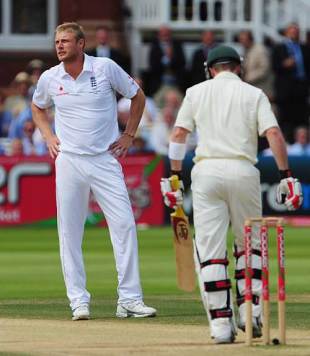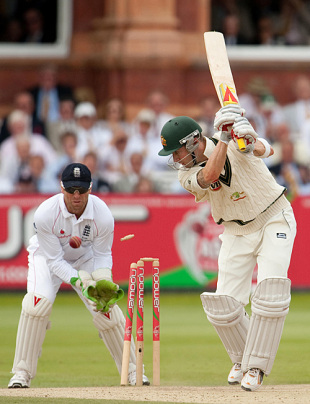England v Australia, 2nd npower Test, Lord's, 5th day
Flintoff ends England's 75-year wait
July 20, 2009
England 425 and 311 for 6 dec (Prior 61, Collingwood 54) beat Australia 215 and 406 (Clarke 136, Haddin 80, Johnson 63, Flintoff 5-92, Swann 4-87) by 115 runs

| ||
| | ||
In his last Test at the home of cricket, Andrew Flintoff broke England's 75-year Lord's curse with his first five-wicket haul since the Ashes-clinching Oval Test of 2005. It was, unquestionably, a performance that will enhance his already mythical status within English cricket, but more pertinently for now, delivered England to a 1-0 series lead heading into Edgbaston.
Victory was sealed 17 minutes before lunch when Graeme Swann, another major contributor on Monday, pegged back Mitchell Johnson's middle stump with the Australian total at 406. The wicket prompted scenes of jubilation not witnessed at Lord's in decades, and a collective furrowing of brows in the Australian dressing rooms as the series momentum shifted sharply in the hosts' favour.
Flintoff, who bowled unchanged for ten overs from the Pavilion End to claim three of the five Australian wickets to fall on Monday, broke first from England's celebratory huddle to shake the hands of the vanquished Johnson and his batting partner, Ben Hilfenhaus. It was a scene that mirrored the final act of the corresponding Test four years ago, and went far to reviving the spirit of cricket that had been battered at several stages in the match.
Having spent the better part of Sunday evening chasing leather to all corners of Thomas Lord's playing field, England could scarcely have began the final day's play more positively. James Anderson's first delivery of the morning cannoned into Michael Clarke's thigh and prompted a raucous lbw appeal from both bowler and slips cordon, which was turned down by Billy Doctrove. Two more unsuccessful appeals reverberated around the grandstands before the first over was out, as Anderson probed pads and off-stumps with pace, precision and just a hint of movement away from the right-handers.
Andrew Flintoff displayed similar menace steaming in from his favoured Pavilion End, as 25,000 screaming voices drowned out the pain of a knee that, after four years of numbing injections, now resembles a pin cushion. Only a famous exit from Lord's would do for Super Fred, and England's allrounder duly obliged with the wicket of Brad Haddin from his fourth ball of the day.
Haddin was seldom ruffled on Sunday, mixing punchy strokes forward of the wicket with deft glides behind, but a new ball and an inspired Flintoff would prove an irresistible combination. Fast and full, Flintoff coaxed Haddin into an edge that flew to Paul Collingwood at second slip, terminating his innings for an impressive 80 but placing Australia in precisely the position they had hoped to avoid. Flintoff, the victor, did not so much celebrate the dismissal as assume Nelson's Trafalgar Square pose. A candidate, if ever there was one, for the fourth plinth.

| ||
| | ||
Johnson's early exchanges inspired little confidence that he would be the man to steer Australia to an improbably victory. Johnson half-ducked, half-stabbed at his first delivery from Flintoff and, as with his bowling, looked a shadow of the figure who compiled unbeaten innings of 96 and 123 against the South Africans four months prior. Edges off the bowling of Flintoff and Stuart Broad fell inches in front of the slips, and Johnson may well have found pavilion-bound had Flintoff not overstepped before wrapping him on the pads with a straight full-toss that struck in line.
Clarke, save for the odd Flintoff bouncer, was a picture of poise in the first half-hour of play, leaving judiciously outside his off-stump and driving with sublime placement and timing. The fluency of his batting contrasted greatly with the nervous Johnson, although the latter eventually found something resembling a groove as the hour progressed.
As the first drinks break loomed, Clarke might have entertained notions of bettering his previous highest Test score, famously struck on his Test debut five years ago, however a change of bowling prompted a change in his fortunes. Swann had spent much of the previous evening bowling a faster, flatter line, but found success with a slower, looping delivery that dropped under the bat of the advancing Clarke and spun just enough into the off-stump. Devastated, Clarke did not lift his head, nor raise his bat, despite a generous reception on his journey back to the Pavilion.
The loss of their sole centurion while still 165 runs in arrears of England appeared the death knell for Australia's aspirations of a world-record run chase. And when Nathan Hauritz was bowled shouldering arms to Flintoff the next over, an England victory was all but assured.
Johnson, by now, had found his batting form and blazed his way to a quick-fire half-century. But it would be in vain. Flintoff claimed his third career five-wicket haul by bowling Peter Siddle, and Swann rounded off the innings, and the match, by scything through Johnson's defences.

